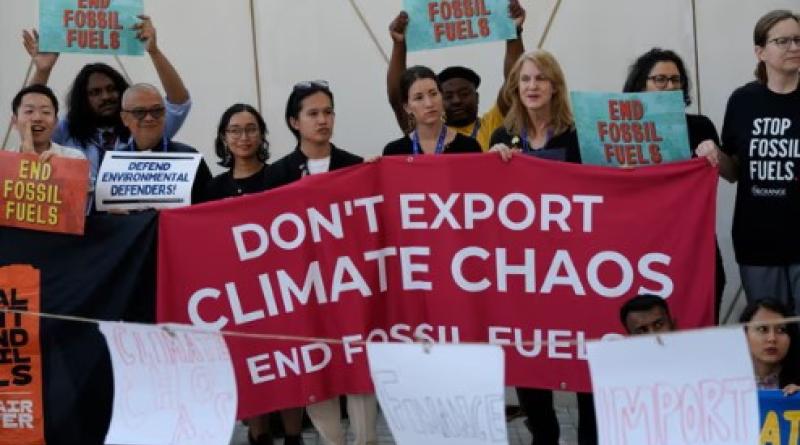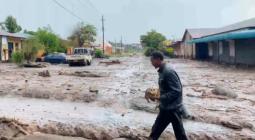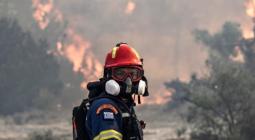Azerbaijan chosen to host Cop29 after fraught negotiations

Azerbaijan has been announced as the host of next year’s climate summit after fraught negotiations.
Under UN rules it was eastern Europe’s turn to take over the rotating presidency but the groups need to unanimously decide on the host. Russia had blocked EU countries and Azerbaijan and Armenia were blocking each other’s bids.
Onlookers were beginning to worry about whether a country could be agreed that would be able to stump up the money and facilities needed to host such a large conference. But Armenia retracted its bid and agreed to back Azerbaijan.
Climate activists are likely to react with concern to the news, given the perception already that Cops have been partly captured by fossil fuel interests. Much like this year’s host, the country of 10 million people on the border of eastern Europe and western Asia relies economically on fossil fuels: oil and gas production accounted for nearly half of Azerbaijan’s GDP and more than 92.5% of its export revenue last year, according to the US government’s International Trade Administration.
Civil society organisations have also said Azerbaijan has a poor record on human rights. On the Freedom Index, a ranking by a US-based NGO, the country is ranked as “not free”, with a score of 9/100 on political rights and civil liberties. Svitilana Romanko of Razon Ukraine said: “Ilham Aliyev’s regime has become increasingly repressive in recent years and political opposition has been all but eliminated.” She added: “This becomes an extremely worrisome trend of fossil fuels not being just weaponised against humanity, which will certainly incite hostility among many nations ruled by petrodictators, but hosting Cops in the countries where human rights have been violently oppressed.”
But there was relief from some that a decision had been reached. “It is good that the uncertainty over who will host Cop29 is over. It means that plans can now be made coming out of Cop28, for the key years of 2024 and 2025 when new climate targets have to be tabled by all countries,” said Kaveh Guilanpour, the vice-president of the Center for Climate and Energy Solutions.
Meanwhile a dozen countries led by the Netherlands have announced a stronger crackdown on fossil fuel subsidies. Fossil fuels benefited from record subsidies of $13m (£10.3m) a minute in 2022, according to the International Monetary Fund, despite being the primary cause of the climate crisis.
At a press conference in Dubai, Wopke Hoekstra, the EU’s climate commissioner, said: “It is time to end the anomaly of fossil fuel subsidies, which are holding us back.”
The Canadian climate minister, Steven Guilbeault, urged countries to ditch subsidies sooner. “Phasing out inefficient fossil fuel subsidies around the world ensures that spending is aligned with climate ambition.”
As the climate summit goes into its final days, the UN Food and Agriculture Organization (FAO) will on Sunday unveil its long-awaited intervention on the future of agriculture in a 1.5C world.
But the FAO roadmap is expected to be short on detail and long on aspiration. The launch is likely to set out some of the main areas of work but leave the big issues for the future, with the promise of laying out more detail at Cop29 and Cop30.
Detailing the future of agriculture is a huge piece of work, but many people are already disappointed that the FAO has seemed so reluctant to grapple with it as a matter of urgency. Stephanie Feldstein, the population and sustainability director at the US-based Center for Biological Diversity, said: “I’m extremely disappointed that the FAO’s roadmap fails to express the urgency of reducing meat and dairy consumption and production to meet the targets set by the Paris climate agreement. We can’t simply stand by and accept endless growth in a sector that’s responsible for so much devastation to our climate, land, water, air and biodiversity. Unless we seriously address the excessive consumption of meat and dairy in wealthy countries, this roadmap is a dead end.”
The Cop28 presidency is now working closely with pairs of ministers to forge agreement on the most contentious aspects of the final decision. The UK will be represented not by Claire Coutinho, the UK’s energy security and net zero secretary, but by her minister of state Graham Stuart and by Steve Barclay, the UK environment secretary. While the UK’s negotiating team is widely admired for its skill and dedication, the absence of the lead cabinet minister for the UK has been noticed. Many countries have told the Guardian they are disappointed that a country that was until recently a strong climate champion that did much good work behind the scenes on bringing countries together is now absent at a high level.





